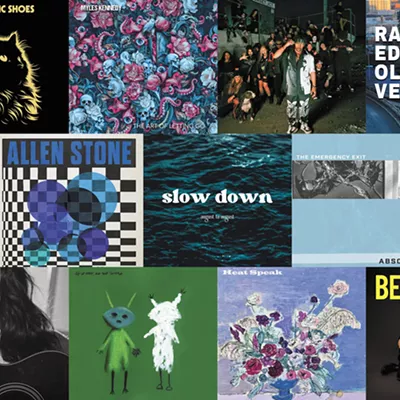In March 2010, New Jersey punk band Titus Andronicus released The Monitor. That grandiose concept album, which used the Civil War as a metaphor for a millennial's quarter-life crisis, catapulted them from underground darlings to year-end listers. While their 2008 debut The Airing of Grievances established the group's basement-punk-meets-Springsteenian-bombast aesthetic, The Monitor upped the stakes in every way. It married historic abolitionist writing with philosopher Albert Camus' absurdism, The Dark Knight references with Walt Whitman's poetry, Shakespearean verse with singer/guitarist Patrick Stickles' shout-along sloganeering: "The enemy is everywhere!" "You will always be a loser!" "It's still us against them!" Given its scope, ambition and realization, there's little wonder The Monitor is often cited as Titus Andronicus' masterpiece.
Also in 2010, my wife (then girlfriend) and I left our beloved Pittsburgh for Syracuse so she could attend graduate school. (I'd been rejected from all 15 creative writing MFA programs I'd applied to.) Twenty-five — the same age as Stickles — and friendless in a strange city, I spent that lonely, snowy year drinking and feeling bad for myself. For work, I wrote product descriptions for the Home Depot website. I expressed, in sometimes shameful ways, a lot of vitriol about the way my life was turning out.
The Monitor was a reliable companion throughout that year. This was triumphant, celebratory music about feeling bad. Its equal doses of self-critique and blind rage at "the enemy" made me feel a little less alone, a little more understood. When I went to visit my sister in Los Angeles at the end of that year, we got drunk and screamed along to every word.
I don't think Titus Andronicus has casual fans — it has fans who got on board with The Airing of Grievances or The Monitor and never got off.
"For the most part we are an underground band," Stickles says. "The fierce devotion of our fanbase, modest in size as it may be, is the reason why we've been able to continue for so long."
Titus Andronicus' songs have soundtracked many of the most significant periods of my adult life. 2015's The Most Lamentable Tragedy — a 93-minute rock opera exploring Stickles' experiences with bipolar disorder — helped me cope with my own emerging mental health struggles. When I found myself working over 60 hours a week across three jobs to pay the bills, 2019's An Obelisk energized me with its raging, stripped-down punk.
The band's latest opus, 2022's The Will to Live, arrived at a time of relative stability and maturity for me. Thematically, the album explores many of the band's evergreen themes, including the idea that the universe is, as Stickles puts it, "a chaotic and absurd place where awesome, catastrophic things seem to happen with no discernable purpose."
But the anger of those early albums has bloomed into empathy, acceptance and compassion. Stickles says The Will to Live is about exploring the "interconnectivity of all life on earth," or that "we as living beings are all component pieces, cells if you will, in a much larger, continuous organism."
This graceful, hopeful response to tragedy — certainly the COVID pandemic, but more personally, the death of Stickles' cousin and founding Titus Andronicus member/keyboardist Matt "Money" Miller — is new for the band.
When I asked Stickles how he thinks about his 22-year-old self, the one who shouted "F— everything, f— me!" on The Airing of Grievances, he said he validates those earlier feelings.
"I understand why I felt that way, and I understand why people would potentially relate to those sentiments." (I certainly did.)
Stickles thinks people sometimes have to go on a "journey from a place of real anger and desperation and hopelessness to ultimately arrive at a place of hope and empathy and compassion towards others." This is true of the narrator of The Will To Live — who Stickles notes is not himself, though they share similarities — and it's true throughout Titus Andronicus' catalog as a whole.
"It's not as cute when you're 37 years old to be a nihilist," Stickles says.
One of the most interesting shifts on The Will to Live is a refinement of who "the enemy" is. The album is their most explicitly political, and Stickles is clearly punching up here. The opening track "(I'm) Screwed" mentions "the master" who's "got the hungry under lock and key" and who "will never let my body be my property." "Baby Crazy" lambasts "wicked men" who "without a pot for piss... done pissed off the populace and turned 'em to misogynists and homophobes and racists."
"It's the classic divide and conquer approach that our oppressors use to pit us against each other," Stickles says. "They're very good at distracting us and convincing us that our enemies are regular, decent, hardworking people that are far more like us than they are different. The last thing in the world that they would want would be for us to form some kind of multiracial, gender-fluid coalition of working people that could ideally make some sort of series of collective demands that would force the powers that be to give everybody a fair shake in this terribly rigged, sick game that they've got us playing."
This punk commitment to the working class is reflected in The Will to Live's penultimate track, a cover of English Oi! band Cock Sparrer's "We're Coming Back" from the punk group's 1982 album Shock Troops. Stickles said the song's "messages of unity, solidarity and togetherness" — particularly the chorus lyric "You'll never walk alone again" — fit nicely with The Will to Live's focus on individuals being a part of something larger. It also kept one of their feet firmly planted in the punk world while they explored Stickles' greater-than-punk aesthetic concept of "Ultimate Rock."
Ultimate Rock, according to Stickles, is a band endeavoring to make an album that is the biggest, boldest and most impactful version of itself. He cites Springsteen's Born in the U.S.A., Metallica's Black Album and Def Leppard's Hysteria as examples. These huge, shiny albums might seem the antithesis of punk. But Stickles notes, "Punk is an ideology and an approach to the creation of art that is distinct from any particular orthodoxy or set of aesthetic signifiers. It just means freedom for the artist, and that the artist is not boxed in by any particular expectations."
Besides, Titus Andronicus is first and foremost a rock band. The TA social media accounts label the group as "The Rock Fan's Rock Band." In a recent Instagram post, Stickles called himself "The King of Bar Rock." To me, there's something slightly tongue-in-cheek — or at least self-aware regarding traditional rock music's current unfashionable status – about these proclamations. But Titus Andronicus truly does understand the power of legendary, populist rock to reach people. This is a band that on 2018's A Productive Cough had the audacity to cover Bob Dylan's "Like a Rolling Stone," shift the perspective from second to first person, and name-drop the actual members of the Rolling Stones. When I saw TA on its (two-year delayed) tour for the 10-year anniversary of The Monitor, the band burst out of their pandemic-forced live show hiatus with a cover of "The Boys Are Back in Town." If Stickles' lyrics are going to reach you, it's going to be via a kick-ass wall of sound as indebted to album-oriented rock as it is to Johnny Rotten.
Fans come to Titus Andronicus for the inextricable combination of philosophy and shredding. Those like me who've aged along with them might've first seen themselves in Stickles' younger narrators — angry, hopeless, but determined to push on with life, and happy to have a righteous soundtrack for it. They might now see themselves in The Will to Live, with a bit more clarity and maybe even optimism for the future, but with no less interest in rocking out. This band means something to people. And in an absurd universe, the search for meaning itself is enough. ♦
Titus Andronicus, Country Westerns • Wed, March 8 at 8 pm • $18-$20 • 21+ • Lucky You Lounge • 1801 W. Sunset Blvd. • luckyyoulounge.com • 509-474-0511




















